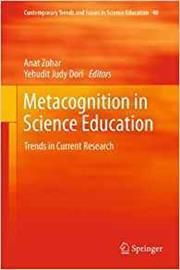How can the teaching of metacognitive skills be achieved?
Metacognition in science education
Anat Zohar and Yehudit Dori (eds)
Springer 2012
280pp | £90 (HB)
ISBN 9789400721319
Metacognition, argue the authors of this interesting and well-timed book, is the third of three main implications for instruction that has emerged from 30 years of studying how people learn. The other two - a consideration of prior knowledge and a concentration of depth over breadth of content - are certainly further along the way of being integrated into science teaching.
This book aims to promote the teaching of metacognitive skills by providing both a useful theoretical introduction about metacognition and its role in science education, as well as several chapters of case studies from across the science disciplines.
So how can the teaching of metacognitive skills be achieved? As an example, in a chapter on visualisations in chemistry using simple reactions involving greenhouse gases, it is argued that students need both to understand the chemistry represented in the visualisation (cognitive ability) and to be able to guide their own learning in using and integrating the visualisation (metacognitive skills). The latter can be achieved through a series of steps. Early activities prompting students to plan or predict what may occur in chemical reactions involving greenhouse gases provide feedback on any basic chemical misunderstandings, so that student predictions develop into a well-reasoned argument. Further detail is continually elicited - ideas about combustion reactions and limiting reagents, for example - through students using videos and simulations to develop their own models of what is occurring in the situation of interest.
This appears to be the core of the process - a scaffolded approach to students engaging with visualisations so that they can learn how to use them in developing their own understanding. The cycle completes with a discussion of how the various ideas proposed by students differ, and a reflection on these ideas to build a consolidated model.
The book has several useful case studies of a similar nature, along with data on their effectiveness in teaching. These, along with the extensive literature review chapters, will make it useful to both educational researchers and educators interested in embedding the teaching of metacognition in their practice.
Purchase Metacognition in science educationfrom Amazon.co.uk







No comments yet